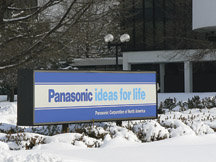Secaucus officials were gearing up at the end of last week for a Jan. 21 meeting with the New Jersey Economic Development Authority (EDA) to protest and lobby against the state’s recent approval of $102.4 million in tax incentives for Panasonic that could enable the company to leave town.
The multi-billion-dollar company that has called Secaucus home since 1974 is considering a move elsewhere, and is weighing tax incentive options in several cities, including Newark, Brooklyn, Chicago, and sites in California.
Secaucus and Hartz Mountain Industries have made a counter offer to keep Panasonic in Secaucus.
________
The law identifies those nine urban transit hubs as Jersey City, Atlantic City, Elizabeth, Paterson, Camden, Trenton, New Brunswick, East Orange, and Newark.
Secaucus Mayor Michael Gonnelli believes the EDA decision pits municipalities like Secaucus against urban hubs like Newark that can use the tax credit to lure companies looking for tax breaks.
In a strongly-worded letter to Gov. Christopher Christie dated Jan. 14, Gonnelli wrote: “I…continue to support and endorse New Jersey’s comprehensive economic development program, as it is well designed to create new jobs and to maintain existing employment opportunities…However, I object to these programs being used for the benefit of one New Jersey municipality at the expense of another and at taxpayer cost. Such use defeats the very purpose of
these programs. They are funded by all New Jersey taxpayers and are intended to benefit the whole state, not to pit one municipality against another.”
Secaucus excluded
Particularly ironic for Secaucus is the fact that it narrowly missed being included in the Urban Transit Hub Tax Credit legislation when it was being drafted in 2007. Secaucus had been considered for inclusion – but was ultimately excluded from the final draft of the law.
“As I remember it, the legislation was drafted with the original nine municipalities,” said Town Administrator David Drumeler. “Later, amendments were added to the legislation that would have added other municipalities, including Secaucus. In the end, those amendments died of excess weight. Legislators in Trenton felt that piling on more towns only served to weaken the original bill. The votes were there to pass the original bill with the nine municipalities and a decision was made not to act on the amendments.”
And with that, Newark remained in the legislation; Secaucus was left out; and the stage was set for the current fight over Panasonic.
But State Sen. Ronald Rice (D-Newark), one of the original co-sponsors of the Urban Transit Hub Tax Credit legislation, said last week the intent of the bill was to target large-scale job creation in municipalities that have unemployment rates that are above the state average – a standard that applies to cities like Newark, but not towns like Secaucus.
“The legislation was intended to bring serious investors to these communities, corporations that can actually devote significant capital investment and employ hundreds of people,” said Rice. “There was the further hope that the program would produce a ripple effect that would get additional dollars flowing through these communities and create some economic stability where it’s sorely needed.”
Ironically, Rice added that the tax credit legislation was also designed to level the playing field for inner cities that had years ago seen companies pulled away by the suburbs.
Remedy on the way?
Assemblywoman Joan Quigley, who represents Secaucus in the state Assembly, had originally tried to get another Hudson County municipality – Harrison – included in the legislation, but was unsuccessful.
Still, she said Mayor Gonnelli is right to be angered by the EDA’s decision and she is already looking at ways to address similar conflicts in the future. Quigley said she is trying to draft a piece of legislation that would prevent municipalities from using state money and other state incentives to attract companies from another New Jersey town.
“I want the legislation to say that if you are the cause of a company closing or relocating – or you’re complicit in a company closing or relocating – you can’t do it with state money,” she said.
But whichever remedy comes out of Trenton – if any comes at all – likely it won’t come in time to keep Panasonic in Secaucus.
While Panasonic mulls its options and tax deals, Secaucus officials still hope to keep the company in town. Working with Hartz Mountain Industries, Panasonic’s landlord, the town has made a counter offer to keep the company in Secaucus. Specifically, Hartz has agreed to rebuild Panasonic’s 1 million square foot facility at 1 Meadowlands Parkway.
E-mail E. Assata Wright at awright@hudsonreporter.com.
